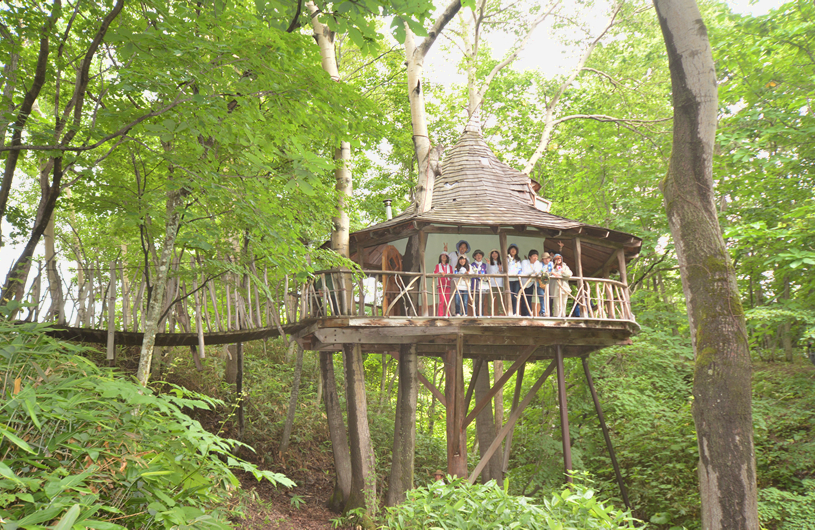
A treehouse in which wheelchair-bound kids can play

A treehouse in which wheelchair-bound kids can play
Imagine for one moment the daily lives of children whose only contact with the outside world is through the window of their home or a hospital ward. Getting muddy while playing with friends; sensing the wind in the forest; rolling around and looking at the sky: just how much support would such moments provide for these children to live? Such considerations by a group of pediatricians led to a movement that began in 2004, to create "Solaputi Kids' Camp" (hereafter, Solaputi), a campsite complete with medical care facilities in Takikawa, Hokkaido.
The campsite has accepted a total of 700 children and family members from throughout Japan, to date.
So as not to burden those living with illness, transportation costs to the campsite from the nearest airport in the region in which they live, and all expenses incurred while staying at the campsite, are free. This was also something the doctors were particular about.

A view of the campsite from Miharashi-no-Oka (scenic hill). (Courtesy of Solaputi)

Run, run, run! (Photograph by Kurose Michio)

Activities that involve riding horses and horse-drawn carriages are popular(Courtesy of Solaputi)
For example, a treehouse built on top of a tree. With "Let's take a trip to the fairy's house over there," as a cue, a special harness is used to "fly" children out of their wheelchairs like wizards. No need to think about how "mom will worry". The families are also liberated amid the great outdoors. "Since I became ill, it's the first time I've seen you smile, Dad!" says one happy child. The kids can also bathe together and show off their wounds to one another. "I'm not alone. There are others like me," says one child who has been given courage by the program. Such memories remain with the children even after returning home to everyday life, giving them the energy to live; such spiritual treatment is difficult to provide in a hospital alone.

(Photograph by Kurose Michio)

Friends around the campfire (courtesy of Solaputi)

Rolling around in the snow, creating unforgettable memories(courtesy of Solaputi)
At Solaputi, the doctors and nurses do not wear gowns or uniforms, as one of their jobs is to help the kids forget about their illness. However, if anything happens during the camp, they're there to deal with it, and are prepared in advance with the help of information from the family with regard to the patient's treatment and condition. As medical staff, they are always on the lookout for sudden changes in the physical condition of participants. The volunteers who live and eat with the kids and run the programs also have an unwritten rule whereby they never say "you can’t" or “don't".

"When the kids receive treatment or take their medication, the atmosphere is more like a school nurse's office than a hospital. The intravenous drip stand is cute and there are lots of things you can choose," says campsite staff, Morikawa Mayumi.

(courtesy of Solaputi)

(Photograph by Kurose Michio)

(Photograph by Kurose Michio)
There are two cottages in which 36 people can stay. The beds, toilets, wash basins, bathrooms and the like are all wheelchair accessible and designed from a universal design point of view. There are no TVs. As a result of this, families talk in the living room and there is more time to play with friends. Contact often continues after the participants return to their everyday lives, and that is also one of the positive things to be gained from Solaputi.

An electric cart adapted for wheelchairs

In the living room of one of the cottages (courtesy of Solaputi)
There are no other facilities like Solaputi anywhere in Japan. The City of Takikawa offers a 16-ha part of the Maruka Highland free of charge to be used as the campsite, but the business is run by the private sector with the help of donations from individuals, corporations and organizations, and volunteers that gather from all around Hokkaido and beyond. According to executive director Sasaki Kenichiro, "Solaputi wouldn't have been possible without Hokkaido's magnificent nature and the benevolence of the people. The camp's merits cannot be expressed in numbers, but thanks to the donations and the support of the volunteers, we are able to organize activities based around things that cannot be expressed in numbers or words."

Once a landscaping consultant in Tokyo and Osaka, Sasaki Kenichiro quit his job and moved to Takikawa.
Solaputi is modeled on the "Hole in The Wall Gang Camp" for children with incurable illnesses, which was opened in the state of Connecticut in 1988 by American film star, the late Paul Newman. Subsequently, the movement spread throughout the United States and to Ireland, France, the UK and elsewhere, and the "Serious Fun Children's Network" was created to increase international cooperation. Last November, Solaputi received appraisal from that organization, and is now recognized as the world's 16th official member.

A former camper is now active as a volunteer (courtesy of Solaputi)
Volunteer training camp takes place twice a year, in spring and autumn. Volunteers that are registered include university students, housewives, nutritionists and medical & welfare workers. According to Sasaki, "There are no conditions regarding qualifications or the like, but importance is placed on skills or personality that allow the volunteers to work closely with the children. Roles are shared according to individual aptitudes – those who can make the camp fun, those who can be with the kids to cry with them, those who can run around behind the scenes, and so on."

Stay-at-home volunteers also create "Solap" and "Solaputi dolls"

Summer camp (courtesy of Solaputi)

Solaputi Kids' Camp Foundation 
4264-1 Marukakogen Ebeotsu-cho Takikawa, Hokkaido, Japan
Tel.: 0125-75-3200
Website